
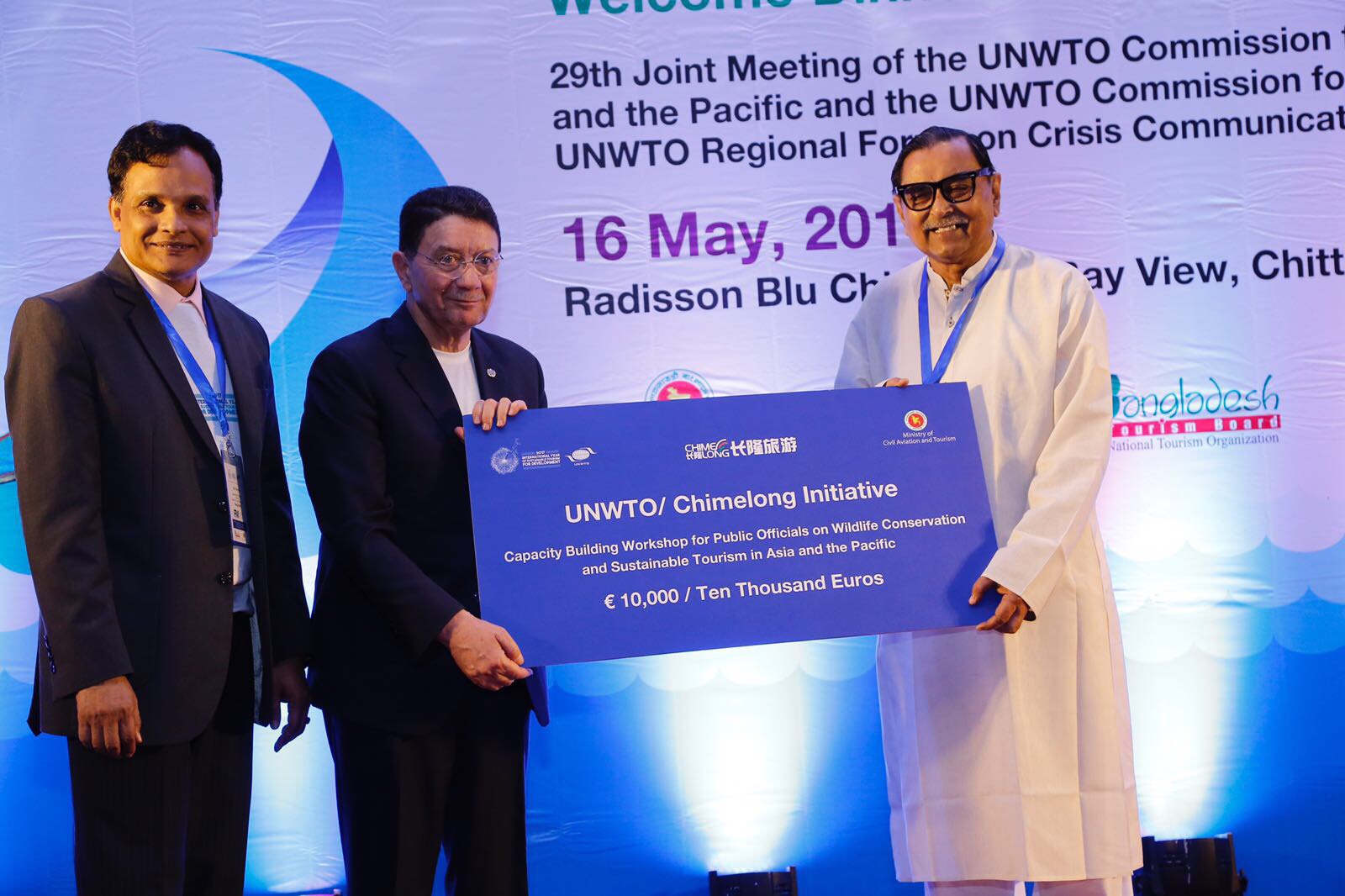
UNWTO Commission for Asia and the Pacific meets in Bangladesh
In 2016, Asia and the Pacific received 309 million international tourist arrivals, 9% more than in 2015; by 2030 this number is expected to reach 535 million. Over 20 countries gathered in Bangladesh on 16-17 May for the 29th joint meeting of the UNWTO Commissions for Asia and the Pacific and South Asia, to discuss challenges facing the sector in the region, opportunities for sustainable tourism development and the programme of work of UNWTO in Asia for the coming two years.
“With growth comes power, and with power, comes responsibility. With 1.8 billion international tourists foreseen to travel the world by 2030, we could end up with 1.8 billion opportunities or 1.8 billion disasters. These 1.8 billion travellers can and should translate into opportunities for inclusive economic growth, for more and better jobs, opportunities to protect our natural and cultural heritage, to better know and respect each other, to bond people, to distribute wealth and share prosperity,” said UNWTO Secretary-General Taleb Rifai, opening the event.
“Tourism can help us achieve the Sustainable Development Goals (SDGs). Your presence in Bangladesh will help us to support our tourism sector achieve its potential,” said the Minister of Civil Aviation and Tourism of Bangladesh, Rashed Khan Menon.
The meeting recalled the advances of the region in terms of visa facilitation, namely in Indonesia and India, in line with UNWTO’s priority to promote safe, secure and seamless travel. It also reviewed the work of the UNWTO technical committees on tourism competitiveness, sustainability, statistics and Tourism Satellite Account (TSA), and the activities being carried out at national level to celebrate the International Year of Sustainable Tourism for Development 2017.
Further items on the agenda included the transformation of the UNWTO Global Code of Ethics into an international convention and the creation of national committees on tourism ethics. Fiji was selected to host the 2018 Regional Commissions meeting and India as the proposed host country of the official celebrations of World Tourism Day in 2019.
Marking the International Year, UNWTO announced its support to Bangladesh in implementing capacity building programmes on wildlife and tourism within the UNWTO/Chimelong Initiative. Wildlife is one of the most important tourism assets of Bangladesh.
The joint meeting was preceded by a regional forum on crisis communication in tourism, with a step-by-step review of how to prepare a crisis communication plan and exchange of experiences in managing communication in situations of crisis, and of strategies for recovery.

2nd UNWTO Report on Gastronomy Tourism: sustainability and gastronomy
A major component of history, tradition and identity, gastronomy has also become a major motivation to visit a destination. According to the 2nd UNWTO Report on Gastronomy Tourism, this tourism segment “offers enormous potential in stimulating local, regional and national economies and enhancing sustainability and inclusion”. The Report was presented in the recent 3rd UNWTO World Forum on Gastronomy Tourism, held in San Sebastian, Spain in cooperation with the Basque Culinary Center.
Sixteen good practices in Gastronomy Tourism from different countries are showcased in the 2nd UNWTO Report on Gastronomy Tourism, touching on issues such as seasonality, training and innovation, ICT-related initiatives and wine-related itineraries. The publication stresses that in terms of tourist motivations, experiencing gastronomy is now at a similar level to visiting a museum, enjoying music and admiring the architecture of a destination. In this sense, gastronomy tourism has strong potential to improve destination management, promote cultures and contribute to other sectors such as agriculture and food manufacturing.
The commitment of gastronomy tourism towards the principles of sustainability has been one of the conclusions of the Forum held in San Sebastian. This includes areas such as poverty reduction, efficient use of resources, environmental protection and climate change, and the protection of cultural values, heritage and diversity.
The event was attended by around 250 participants from 60 countries and was inaugurated by UNWTO Secretary-General Taleb Rifai, Eneko Goia, Mayor of the City of San Sebastian, and the Director of the Basque Culinary Center, Joxe Mari Aizega.
The engagement of the traveller in these principles through his/her gastronomic experience was also underlined throughout the Forum. The need to develop appropriate policy measures and a strong governance framework was highlighted as a major conclusion. This would facilitate not only the commitment of relevant actors, but also the interaction among them, as well as the development of private-public partnerships.
The union between gastronomy and tourism provides therefore a platform to revitalize cultures, to preserve tangible and intangible heritage, to empower communities and to enhance intercultural understanding. These aspects were particularly tackled during the practical experiences included in the Forum, such as a cooking class and farm-to-table dining experiences.
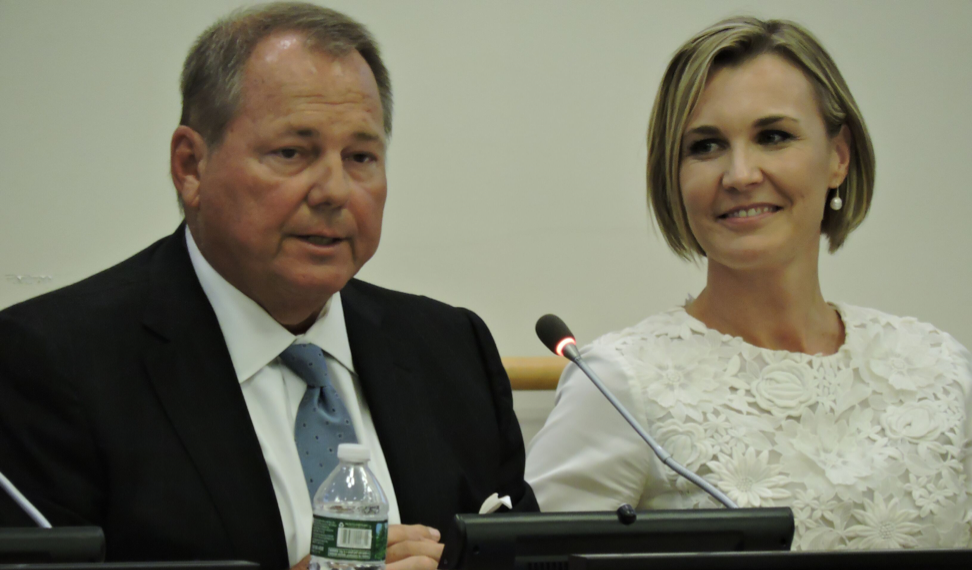
Keeping Children Safe: a success story of the leadership for sustainable tourism.
Hearing Paul Sistare speaking last September at the United Nations and this year at the Global Child Forum and World Childhood Foundation Brasil event in São Paulo was so inspiring. Chairman, Founder and former CEO of Atlantica Hotels in Brazil, Paul has demonstrated what businesses can do to keep children safe and reduce the risks of child abuse and trafficking. It is a sentiment we share at the World Childhood Foundation USA (Childhood USA), an organization with the vision that every child should be free from violence and child sexual abuse and exploitation. We need more champions like Paul, who know how to successfully and in a sustainable way engage their companies, employees, purveyors, clients and guests in doing what each of us should be doing: keeping our children safe. Over the last 12 years, Paul has led the Atlantica Hotels work in partnership with Childhood Brasil to develop and implement a program for prevention of child abuse and exploitation, and raising money for the victims, a program which we believe will inspire all of you to take action.
We want to share Paul’s story to highlight the role of business in child protection, and to demonstrate how a corporate leader can become an agent for change. By partnering with an NGO, such as Childhood, businesses get technical and strategic support and expertise that makes the program scalable and sustainable. With over 1 Billion children every year exposed to violence, and the economic impact of violence against children reaching up to 7 Trillion Dollars, it is urgent that we act NOW.
After a very successful Global Child Forum last month in São Paulo, that was co-organized with Childhood Brasil, Dr. Joanna Rubinstein, President and CEO of Childhood USA, called Paul to interview him to learn how to engage other companies within the travel and tourism industry in ending violence and abuse of children.
JR: Paul, when did you for the first time reflect on child sexual abuse in the travel and hospitality industry?
PS: I have had the privilege of being in the hospitality industry for nearly 45 years and have operated in virtually all the continents of the world. At the very beginning, when I was based in Orlando working for Walt Disney World at the time EPCOT was being opened, I was emotionally overwhelmed with the number of terminally ill children who had said that visiting Disney World was their dying and last wish. This was the beginning of the Make a Wish Foundation where myself, representing Disney and members of the airlines and the Orlando community sought to fulfill these wishes for not only just the children but also the family. A rewarding experience indeed but heart-breaking. I keep to this day, letters and obituaries from the families that I hosted at Disney. Today, the Make a Wish foundation is helping families and their terminally ill children all over the world. One last wish…
Leaving Disney and working for another international firm based in Hong Kong but with over 300 hotels worldwide, I became aware of the number of homeless families during the tumultuous 80’s where particularly in the US, families were forced to live on the streets at no fault of their own. Rather than simply turning away from this problem, I partnered with Habitat for Humanity and challenged my hotel group to build 50 homes across the states and countries we operated. My team took up the challenge and surprised me by exceeding our goal and built 80 homes in one year which attracted the attention of former President Jimmy Carter who invited my wife and I to a lovely dinner at their home to celebrate our involvement with the group.
Arriving in Brasil was an eye opener for me especially because building out Atlantica Hotels into 44 cities in Brasil, I visited many areas that many Brasilians themselves did not know. The one thing I saw in common in all the cities I visited (rich or poor) was the multitude of children on the streets trying to survive. Little did I know at the time that their parents were forcing them to work the streets not only just begging, but even selling their tiny bodies to unscrupulous tourists. As this dawned on me from personal experiences, we created an internal program called “Criança Feliz” to help the street children in the communities where we operated our hotels. It was only a year later that we discovered that although Atlantica was an outstanding hotel operator, we knew nothing about NGOs or charitable organizations. We had amassed a significant sum of money but had no idea as to how to deploy the funds to actually change lives. In 2005, we partnered with Childhood Brasil and the rest is history and now our future.
JR: How did you decide what needs to be done and how to implement it, or who would be the right partners for Atlantica Hotels?
PS: It is said to do what you do best. Atlantica Hotels is the best and largest private hotel operator in Latin America. We know how to clean rooms, attract guests, cook and serve food and make a profit for our clients and shareholders. What we did not know was how to change the lives of the children that were being abused. We realized that the hospitality industry was at the front lines or rather ground zero of the war. We had the means to change lives and expose the issues; but we did not have the infrastructure. The partnership with Childhood Brasil allowed us the freedom to build an infrastructure together while we could focus on our core business while contributing to our community. The associates of Atlantica, with the help of Childhood, began to realize that their jobs at Atlantica had both a role and a purpose not only in the necessity of providing a livelihood for their families but all members regardless of their positions in the hotel could contribute to their community and change lives for the better. The 5,000 members of Atlantica’s team and over 25 million guests readily embraced the concepts with Childhood Brasil. The government was much slower to recognize the problem. However, persistence and consistency paid off and various ministries recognized the value that Atlantica Hotels and Childhood Brasil were implementing in the respective communities. It was good for business and now it was good for the government.
JR: How did you persuade your Board that Atlantica Hotels in Brazil should engage in protecting children from abuse and exploitation?
PS: Persuading and engaging a Board is really not the entity that will have significant impact. Their focus and role is to provide direction and improve shareholder value. They look to the CEO to implement actions to do so. In the tourism industry, engaging with the community is just good business. The question then remains as to how to engage most effectively to raise the profile of the business and achieve the board’s goals.
JR: What major challenges did you encounter and how did you overcome them?
PS: The first challenge was almost overwhelming, as in 2005 we needed to get over 5,000 team members to understand the mission of Childhood and then train them in a sustainable manner. Turnover in the hospitality industry is normally around 50%. So as one individual comes in, one goes out. The challenge was to maintain the momentum. In that challenge, we recruited “mentors” and “champions” in each hotel that adopted the initiatives and kept the team engaged. We quickly found out that these individuals needed to be line level staff who spoke the language of the team.
Secondly, came the government. The Tourism Ministry refused to accept that there was a problem. It was not until I used the words in a speech sanctioned by the President of Brasil that the Ministry backed down. Moreover, 25 million guests and 5,000 people in 44 cities gradually won the government over to create a Childhood Day, a Ministry dedicated to Children and a nationwide program to denounce child abuse, child slavery, child sexual abuse and child tourism. In fact, the government passed a law that now unaccompanied minors must show proof that they have their parents’ permission to be traveling with another adult such as a relative or in school or religious groups.
JR: 2017 is the year of sustainable tourism. Together with the new global goals, the Sustainable Development Goals, it offers new opportunities to address the issue of child abuse and trafficking. Travel and hospitality industry can help to achieve the SDG 16.2 target – ending abuse, exploitation, trafficking and all forms of violence and torture of children by 2030. How can we get other companies and hotel chains to replicate your successes and accelerate progress toward reaching this ambitious goal?
PS: Other tourism industries need to be exposed to the success of Atlantica’s culture and accept that they are at the front lines of a global war. Perhaps it is just winning a battle or two but it is small battles that win a larger war. The realization is that this war is far from being won. But the sustainable actions of creating a culture and not just a program will change the life of one child which becomes a force multiplier.
JR: What are you most proud of and consider your greatest accomplishment?
PS: While the first 2 or 3 years working with Childhood Brasil was challenging, mostly due to my impatient personality, today, we have over 5,000 Atlantica Hotel team members embracing the cause and 25 million guests are aware of Childhood Brasil. We also have 8,000 clients engaged as well as the requirement with our purveyors that in order to do business with us, they have to sign the “Code of Conduct.” We have supported the building of 7 shelters for victims. We have given dignity and respect to those who have been abused. Although being the largest financial supporter of Childhood Brasil could be considered as a great accomplishment, however, money does not ensure sustainability. Today, the Childhood program in Atlantica is fully integrated and is no longer just a program implemented because the CEO “said so.” Today, Childhood is part of the fabric of Atlantica. It is part of the culture of Atlantica. Therefore it is sustainable.
|
|
|
| ATLANTICA HOTELS | |
Founded in 1996 by Paul J. Sistare, Atlantica Hotels, based in São Paulo, Brazil, is the largest privately held hotel management company in South America. Atlantica Hotels maintains exclusive strategic alliances with Choice Hotels, Carlson Rezidor Hotel Group and Hilton. With over 5,500 employees Atlantica Hotels currently operates 87 hotels which total more than 14,500 rooms in 44 cities in Brazil, and more than six thousand hotels around the world in its reservation portfolio. Atlantica Hotels is also one of the largest supporters of Childhood Brasil committed to the prevention of child sexual exploitation.
World Childhood Foundation
Founded in 1999 by Her Majesty Queen Silvia of Sweden with the mission to defend children’s right to a happy and safe childhood, free from sexual abuse and exploitation, the Foundation has provided support to over 1000 projects in more than 20 countries including the US. In recent years, Childhood USA (one of the four Childhood Offices) under the leadership of HRH Princess Madeleine, launched the #EyesWideOpen advocacy initiative with the goal to build greater awareness surrounding the issue of child sexual abuse, and to focus on prevention providing tools like the Mobile App http://socapp.org to prevent, recognize, and respond to child sexual abuse and exploitation. For more information visit www.childhoodusa.org and www.thankyou.org/eyeswideopen

UNWTO Passes Another Milestone
Professor Geoffrey Lipman co-founder SUNx, President International Coalition of Tourism Partners (ICTP) witnessed Friday’s election proceedings by the UNWTO Executive Council meeting in Madrid.
He writes:
I was reminded of Mrs Thatcher’s quip ”It’s a funny old world” watching the final stages of the election for the UN World Tourism Organization’s – Secretary General. The decision last week, of 33 Members of the Executive Council had several twists and turns before Georgia’s Ambassador to the Madrid based body, Zurab Pololikashvili – emerged victorious from a very close run off with Zimbabwe’s Minister of Tourism Walter Mzembi.
It started with the Seychelles candidate – former Tourism Minister Alain St. Ange – being disavowed by his country, under extreme pressure for solidarity from the African Union. Passionate and articulate St. Ange laid out the realities of his situation with a skill that hung over the rest of the process. It elicited a massive applause from the assembled UNWTO members.
Then the main event started
Each of the 5 remaining candidates laid out a 4-year plan for governing the organization. It was rich with ideas and it showed the wide range of challenges and opportunities facing the organization in the coming years. Security with ease of travel: digital technology: cyber resilience, sustainable development and climate change emerged as top concerns. At the same time, there was a widespread call for reshaping of an organization that already punches above its weight, to provide adequate financing, people, and technology to allow it to fulfil its mission. The style of each candidate was shown in a ten-minute presentation, differentiating them by vision and by charisma.
On one thing there was complete unanimity – the new Secretary General will have a tough act to follow in Taleb Rifai – who in his 8 years at the helm has brought the organization and the sector to a new level of sector leadership and public recognition.
In retrospect, the election itself reflected this, it was well organized, professionally managed with a balance of openness and internal process. Now it will be up to Zurab to deliver on the promise. (I predict that he will be known by his first name – at least on the tourism circuit)
Finally, I was pleased to see that climate resilience was one of his talking points – because it will be on his watch that broader recognition of the existential nature of this challenge will escalate. Our sector will have to radically reposition to respond. SUNx will be a constant reminder.
Professor Geoffrey Lipman co-founder SUNx, President International Coalition of Tourism Partners (ICTP).
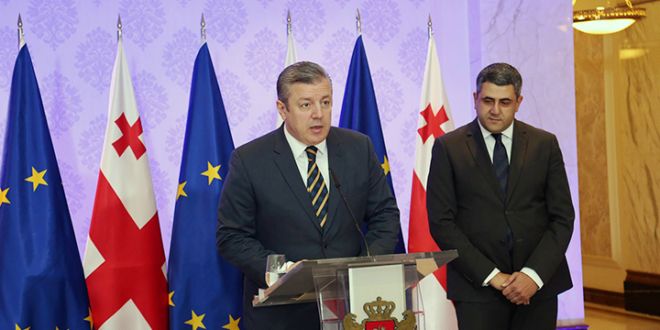
A great day for Georgia, but also for the world of tourism?
Is this a good or a sad day for World Tourism? The large camp attending the Executive Council in Madrid from Georgia obviously is having a great day.
Zurab Pololikashvili, the candidate for the UNWTO Secretary General from Georgia was elected this afternoon as the next secretary-general. He received 18 votes in the second round in Madrid today. In the first round, Georgia had 8 votes, Walter Mzembi from Zimbabwe 11 votes.
One can only congratulate the prime minister of Georgia for his support. The Georgian ambassador in Madrid almost appeared to be on the sideline during the campaign.
This election result may not have been the best candidate, but about international politics and deals in return for favors.
After his victory, Zurab Pololikashvili was seen drinking champagne with his team. He did not attend the press conference with Taleb Rifai after the election. During his campaign, there was no media outreach, and the candidate was absent from most international events. For most of us in the press, Mr. Pololikashvili remains a no-one.
The secretary general-elect related a message to all candidates after his inauguration and offered to work with them in the future.
Plan B for defeated candidates would be to contest the election at the upcoming General Assembly in China?
In such a case 2/3 of all member countries have to confirm the recommendation of the executive council.
Taleb Rifai said at the press conference today he knew Zurab for many years. He called him a good man capable of doing the job. He cited his experience as the former minister of tourism for Georgia. He ended in saying democracy had spoken.
The secretary general also said. There were two criterions for the vote:
1) The character, vision, and knowledge of a candidate.
2) The country this candidate represents and its standing in the world.
It appears this type of “democracy” may be controlled actually by the foreign ministries or heads of state and not the tourism ministers or tourism representatives in many voting countries.
Bilateral deals are cut by foreign ministers or heads of state and are often unrelated to travel and tourism.
A voting executive council member actually not only has a responsibility to its own nation, but to 4 other countries. There is 1 executive member for every 5 UNWTO member countries
Perhaps such an important decision should only be made by the full general assembly of the UNWTO.
Our largest industry, travel & tourism is too important to be dealt with on a sideline.
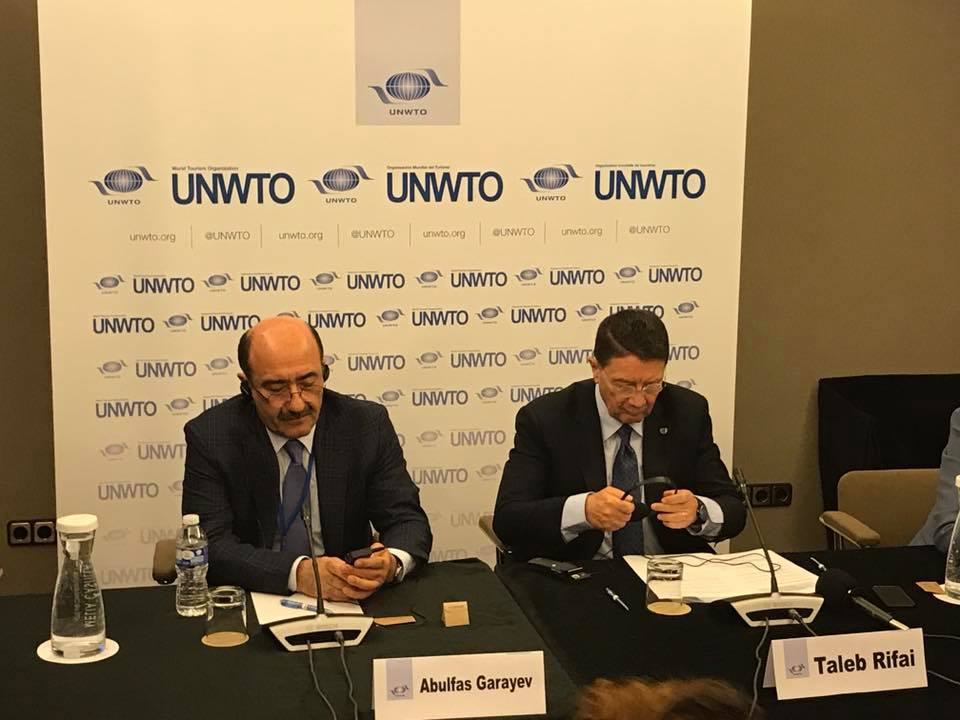
105th UNWTO Executive Council meeting concludes in Madrid
Madrid, Spain, hosted the 105th meeting of the Executive Council of the World Tourism Organization (UNWTO) between 11 and 12 May. The Meeting focused on current trends and challenges facing the tourism sector and on the three priorities of the Organization – safe, secure and seamless travel; the impact of technology in the tourism sector and sustainability.
The Executive Council, attended by some 250 representatives from 59 countries, focused on these priorities as well as on the UNWTO programme of work for 2018-2019 and the agenda of the International Year of Sustainable Tourism for Development 2017.
The 105th session of the UNWTO Executive Council also recommended Zurab Pololikashvili, from Georgia, as the nominee for the post of Secretary-General for the four-year-period starting January 2018. This recommendation will be submitted to the 22nd UNWTO General Assembly for ratification (11-16 September 2017, Chengu, China).
“We predict that 1.8 billion international tourists will travel across borders by 2030. We must ensure that such growth goes hand-in-hand with sustainability. We must embrace the opportunities created by innovation and new technologies. We must continue to make travel safer, but also more seamless and accessible for all. And we must ensure that our sector serves the planet as well as its people” said UNWTO Secretary-General, Taleb Rifai, opening the meeting.
“UNWTO is a privileged forum where all countries discuss the main challenges facing our sector, share experiences and build common solutions. Tourism is about building bridges” said the Secretary of State of Tourism of Spain, Matilde Asían.
The Chair of the Council, the Minister of Culture and Tourism of Azerbaijan, Abulfas Garayev, recalled the importance of the declaration by the United Nations General Assembly of 2017 as the International Year of Sustainable Tourism for Development “This is a unique opportunity to raise awareness of the contribution of sustainable tourism to development among public and private sector decision makers and the public, while mobilizing all stakeholders to work together in making tourism a catalyst for positive change”, he said.
The 106th and 107th sessions of the UNWTO Executive Council will take place in September 2017 in Chengdu, China in the framework of the 22nd UNWTO General Assembly.
The Executive Council is UNWTO’s governing board, responsible for ensuring that the Organization carries out its programme of work. It meets at least twice a year and is composed of 33 members elected by the General Assembly in a ratio of one for every five Full Members. As host country of UNWTO’s Headquarters, Spain has a permanent seat on the Executive Council. Representatives of the Associate Members and Affiliate Members participate in Executive Council meetings as observers.
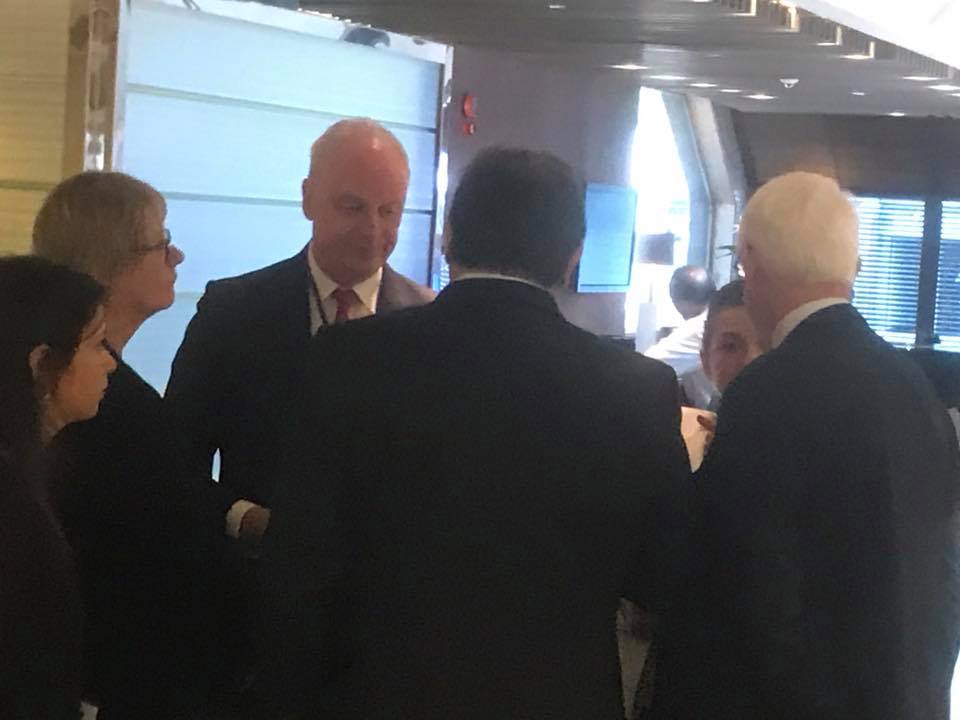
Taleb Rifai: I am proud of all candidates
Taleb Rifai, the current secretary – general of the United Nations World Tourism Organization (UNWTO) told eTN today: ” I am proud of all candidates today and found great value in all presentations I heard.”
Today the Executive Council of the UNWTO is meeting in Madrid to select a new leader for world tourism.
All five candidates presented their ideas this morning and executive council members are now voting to present their selection to the next full assembly in China later this year. A result is expected within an hour or two from publishing this article.
Media was not allowed to attend the presentation, but eTN managed to get feedback from some delegates attending the event.
In a nutshell, the presentation by the Zimbabwe minister Waler Mzembi (published by eTN earlier) was very detailed and showed a high level of knowledge and vision.
The same was true for the presentation by Carlos Vogeler, who is the running mate with candidate Dho Young-shim from Korea.
Dho Young-shim complimented her part of the presentation in listing achievements pointing out sustainable tourism projects and her love for Africa, assisting developing countries with the STEP program this candidate was leading for the last ten years.
The presentation by Zurab Pololikashvili, the candidate from Georgia was disappointing. Marcio Favila from Brazil address was well thought through. eTN did not get a feedback on the presentation from Colombia.
Strangely Alain St. Ange was allowed to address the executive council before the election. His emotional speech most likely influenced the election.
At the press conference after the election, Taleb Rifai explained. There are two factors a candidate is judged:
1) By his or her ability to lead, character and vision
2) By the country and the standing of the country he or she represents.
After the presentations candidates were seen in suspense talking about the possible outcome.

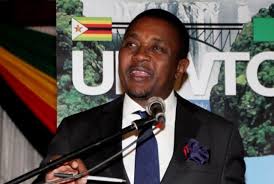
Transcript: Hon. Walter Mzembi addressed the Executive Council
The Hon. Walter Mzembi just delivered his official pitch to become the next UNWTO Secretary-General to delegates attending the Executive Council meeting in Madrid at the Melia Castilla Hotel.
The transcript of his address he gave shortly after 10.30 am this morning.
Your Royal Highness
Excellencies, Secretary General, Ladies and Gentlemen
The world finds itself in a different place today than where it was twelve months ago!
The global environment which characterized Taleb’s tenure of office has changed, presenting new, multi-faceted challenges for our sector and, inevitably, for his successor.
Ladies and Gentlemen, I present my candidature in an environment replete with challenges inter alia:
- a new and intensifying trend towards isolationism and intolerance by state administrations;
- the apparent shift towards unilateralism and populism;
- the issue of migration and its unintended consequences on the receiving countries;
- the threat of cyber-terrorism and the unintended consequences of the ICT revolution, and
- the threat of terror directed at the tourism industry now more pronounced than ever before. Equally so, the travel-related impact of natural disasters – many of them the direct consequence of climate change: especially in small-island developing states.
It is clear that the next Secretary General will have to grapple with the impact of political decisions emanating from nation states against each other – where diplomacy has given way to unilateralism, and where tourism-economies find themselves negatively impacted.
Accordingly, the incoming Secretary General, will have to be suitably equipped – in terms of qualification, professional experience, general aptitude and craft-competence – to successfully confront these challenges and to effectively respond to the expectations of members states in this changing world.
I believe my candidature amply responds to the requirements of the task ahead.
I present myself as a change agent – ready and equipped to renew and reposition our Organisation going forward.
The essence of my vision for the future development of global tourism as enunciated in my Statement of Policy and Management Intent, lists a four-pronged Agenda covering the following areas;
- Administrative and Governance Reform of the Organisation
- Resource Mobilisation and Business Development
- Responsible Tourism and Sustainability
- Organisational Repositioning and Brand Development
My candidature is about
- reform and renewal of the Organisation;
- providing leadership which will take the UNWTO beyond marketing excellence into the realm of high-level diplomacy and statecraft: and to new levels of global visibility and relevance;
It is about
- building an Organisation with more universal membership;
- to enhance its effectiveness and relevance within the broader UN family so that tourism, with its cross-cutting presence within all 17 SDG’s, can meet its obligations under the SDG framework;
It is about
- building a more fully inclusive Organisation;
- one which accommodates and reflects all views and which seeks, through inclusive consultation, to find comprehensive solutions to the challenges which confront the industry today;
It is about
- ensuring greater fairness and equity in the development and growth of global tourism, especially in the emerging world where tourism receipts continue to lag significantly behind other parts of the world;
It is about promoting Sustainable Tourism, Green Growth, Community Empowerment which expresses itself in all the SDGs, in particular SDG 8, 12, and 14;
My candidature will re-enforce a global regime on openness and safe secure and seamless travel, signposting sectoral contribution to global GDP from 10% to 15% during my tenure.
It is about
- maintaining a lean and efficient Secretariat which is more reflective of the UNWTO’s broad membership and more gender sensitive. If elected, I will have adequate time before taking office to study the existing structure and to determine what reforms, if any, maybe be required to refocus and re-direct the existing skills and expertise, whilst also allowing infusion of new blood;
- I shall inaugurate a Commission on Small Island Developing States, SIDS, some of them exclusively tourism-economies to look after issues of relevance to them, including implementation of relevant SDG’s, particularly SDG 14, Life Under Water; and the Paris Climate targets by 2050;
- I am in favour of Regional Commissions becoming more visible, present and operational in their respective theatres of activity; and I intend to foster tourism policy consummation, institutionalization and positive working relationships between regional commission offices at the headquarters and Regional Economic Communities (RECs). We need to develop shared programmes of work and this would not necessarily necessitate setting up offices, but devolving work content to points of application and implementation.
- I commit myself to establishing a monitoring and evaluation mechanism to facilitate the timeous implementation of our resolutions and decisions.
It is about
- working tirelessly to secure Tourism’s place as an integral component within the broader trade and investment value chain : after all, each trade and/or investment begins with a visit;
It is about
- initiating debate on the creation of a Global Tourism Fund – an innovative and sustainable source of funding for global tourism development – leveraging on tourism’s chief indicators – i.e. arrivals, expenditure etc; creating space within ODA for tourism-related funding; leveraging Public-Private-Partnerships to fund and implement infrastructural projects that connect destinations and product-development;
My candidature is about
- building the Organisation’s capacity to respond more effectively and practically to issues such as Tourism and Security, Travel Bans, the Use/Abuse of Travel Advisories; the impact of Currency Fluctuations; Pandemics; Climate Change, Natural Disasters; Child Sexual Abuse; and the complex, sensitive issue of Migrants;
With regard to this latter issue, my Vision speaks to the need for some form of “Marshall Plan” approach – to stem the flow of migrants by way of targeted investment in tourism, creating employment opportunities at home so that, in future, we have tourists…..not migrants on our door steps.
My candidature is about returning shareholder interest and value to the Organisation.
Observe the unprecedented level of political participation and interest in this Executive Council meeting : obviously attracted by the overtly political content of our Agenda – specifically the future leadership of the Organisation.
My candidature is premised on ensuring that this level of political and shareholder interest and attendant participation is sustained throughout the year, every year; to look at critical issues such as membership-recruitment, transformation of the Global Code of Ethics into an International Convention, and Tourism Security which are clearly political and not secretariat functions .
Excellencies, I am convinced that this vision’s realization lies, essentially, in transformative leadership – exactly the calibre of leadership which I offer.
Beginning April last year when I entered this race, I have traversed the world, attending all Statutory and Regional Commission meetings and engaging face-to-face with Tourism and Foreign Ministry authorities in all 33 Executive Council member states. I have attended many WTTC Summits, contributing and learning. I also sought input from the Associate Member Flanders.
I did so to gather a deeper appreciation of tourism and the challenges it faces in each geographic region of the world. I listened to and learnt first-hand the concerns and hopes for the future of global tourism under the umbrella of the UNWTO.
In several instances, colleagues shared with me their disquiet concerning (i) the static membership of our organization (ii) the possibility of further withdrawals from it; (iii) the worryingly low level of political participation at key meetings – and the gradual relegation of responsibility, by Ministers, to officials.
Member States aspirations far exceed the value that the organization is currently rendering. Granted, they derive benefit in terms of technical support, but, they expect and indeed deserve more – especially in terms of developmental support aligned to SDG Goals.
If we fail to correctly interpret these signs, or to act upon the messages they convey, and if we believe that a status-quo approach towards the future is good enough, then I believe, truly, that we are undermining our own Organisation and preventing it from attaining its full potential – in terms of global relevance and impact – of which it is surely capable.
The Vision and the substance of my Statement of Policy and Management Intent derive, therefore, from a lengthy, personal engagement with the entire Executive Council and reflects your collective input.
My candidature is unique in another very important aspect. I speak of the fact that I carry the endorsement of the entire African continent.
My CV speaks for itself in terms of academic and professional qualifications and deep-rooted experience in the tourism sector including my tourism-related legacy at the AU.
You all know the passion, energy, mental agility, and determination I bring to the table.
I am more than ready to serve global tourism and will do so to the very best of my ability.
Allow me to thank you for the opportunity to share my vision for the future of the UNWTO with you.
It would be remiss of me not to pay special tribute and commendation to Dr. Taleb Rifai for his outstanding service to our organization. Taleb I salute you !
I Thank You!
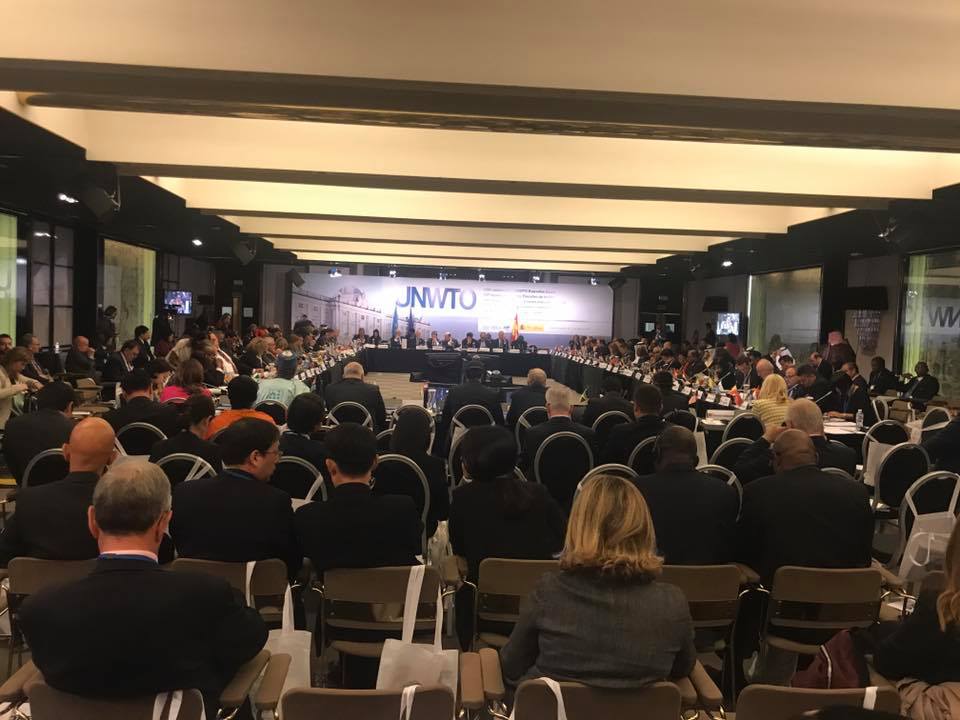
World Tourism is divided today in the Melia Castilla Hotel in Madrid
He is seen as a committed tourism leader, having served in Brazil as deputy minister of tourism and then as an executive director at UNWTO.
He told eTN today: “The important part for me is, that there is a day after tomorrow, and all of us must be united the day after tomorrow. It’s why I never talked about any other candidate.”
He continued to say “I did not cut any deal with countries to vote for me. I want to be judged on issues and on what I can bring to the table. I am very optimistic.”
There is also Ambassador Jaime Alberto Cabal from Colombia who has been quiet.
There is Georgian Ambassador Zurab Pololikashvili who eTN publisher Juergen Steinmetz accused of conspiring with his prime minister to earn votes through bilateral deals unrelated to issues and qualifications, or even tourism. Zurab was seen in the lobby of the Melia hotel shaking hands with delegation leaders.

UNWTO High Level Task Force Meeting on Tourism and Security convenes in Madrid
The integration of national security with tourism security, crisis communication and travel advisories were some of the key issues discussed at the 1st Meeting of the High Level Task Force on Tourism and Security, organized by the World Tourism Organization (UNWTO) today in Madrid. The event took place ahead of the 105th UNWTO Executive Council meeting to be held in Madrid, home of the UNWTO Headquarters, on 11 and 12 May.
The Task Force Meeting gathered representatives from UNWTO Member States, UN organizations such as the United Nations Office on Drugs and Crime (UNODC), and private sector entities such as the International Air Transport Association (IATA), the Pacific Asia Travel Association (PATA), the World Travel and Tourism Council (WTTC), the Federal Association of the German Tourism Industry (BTW) and the Association of British Travel Agencies (ABTA).
“The Task Force was established by the UNWTO Executive Council to help us reinforce our action and cooperation towards safer, more secure and yet more seamless travel,” recalled UNWTO Secretary-General, Taleb Rifai, opening the meeting.
Actions such as joint police work between Spain and source markets for specific events or times of the year, tourism training for security forces in Jamaica, the tourism and security task force in Kenya, and the experience of the tourism police in Thailand were some of the cases shared during the meeting by UNWTO Member States.
Also on the table were issues of public and private sector cooperation in operational crisis management and communications, and the tourism sector addressing possible tightening of security measures.
The work of the Task Force will focus on five key issues: 1) the integration between tourism and security; 2) support to the sector in setting crisis management plans and protocols; 3) travel advisories; 4) safe, secure and seamless travel including visa facilitation; and 5) crisis communications.
These areas will be addressed by specific working groups tasked with developing recommendations and guidelines to be presented at the UNWTO General Assembly.
